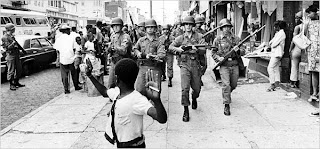There is a list of constant and variable factors that, when combined, often lead to police corruption. The constant factors consist of:
- Discretion - Descrition has both bad and good qualities. If used correctly discretion should not be a problem, but when taken advantage of discretion is a huge problem.
- Low managerial visibility - Officers do a majority of their work with very little supervision. The managers are not there watching over their shoulder to make sure they are doing everything correctly.
- Low public visibility - A majority of what an officer does is not seen by the public.
- Peer group secrecy - Officers have a strong bond with one another. Internal solidarity and secrecy is a large part of police culture.
- Managerial secrecy - Most managers have worked their way up from an entry level officer and have a lot of values in common with those they manage.
- Status problems - Police officers are often underpaid compared to the amount of power they have.
- Association with lawbreakers/contact with temptation - Police are always coming into contact with people who break the law and may have a access to resources. (Newburn, 1999)
- Community structure - Police are often influenced by politics, culture, and the standards and norms of those surrounding them.
- Organizational characteristics - "Levels of bureaucracy, integrity of leadership, soliditary of work subcultures, moral career stages of police officers, and the perception of legitimate opportunities." (Newburn, 1999)
- Legal opportunities for corruption - Crimes that are considered victimless crimes and using minor or trivial regulations, such as construction, traffic and licensing, for exploitation.
- Corruption controls - How the police are policed themselves.
- Social organization of corruption - Take place in ways of an arrangement or an event.
- Moral cynicism - Due to the inevitable association with those who break the law and the contact of temptation, officers are often directed towards moral cynicism. (Newburn, 1999)
In order to prevent police corruption from occurring there should be more consequences, even for actions that don't seem to matter. The small corrupt activities need to be noticed and brought to the officer's attention that what they did was unethical and that any further corrupt activity will lead to more serious consequences. A police officer has a lot of power and the power should not be used unethically to engage in corrupt behavior(s).
References
Newburn, T., Understanding and preventing police corruption: lessons from the literature. Policing and Reducing Crime Unit: Police Research Series. . 1999.
Punch, M., Police corruption and its prevention. European Journal on Criminal Policy and Research. 2000.








